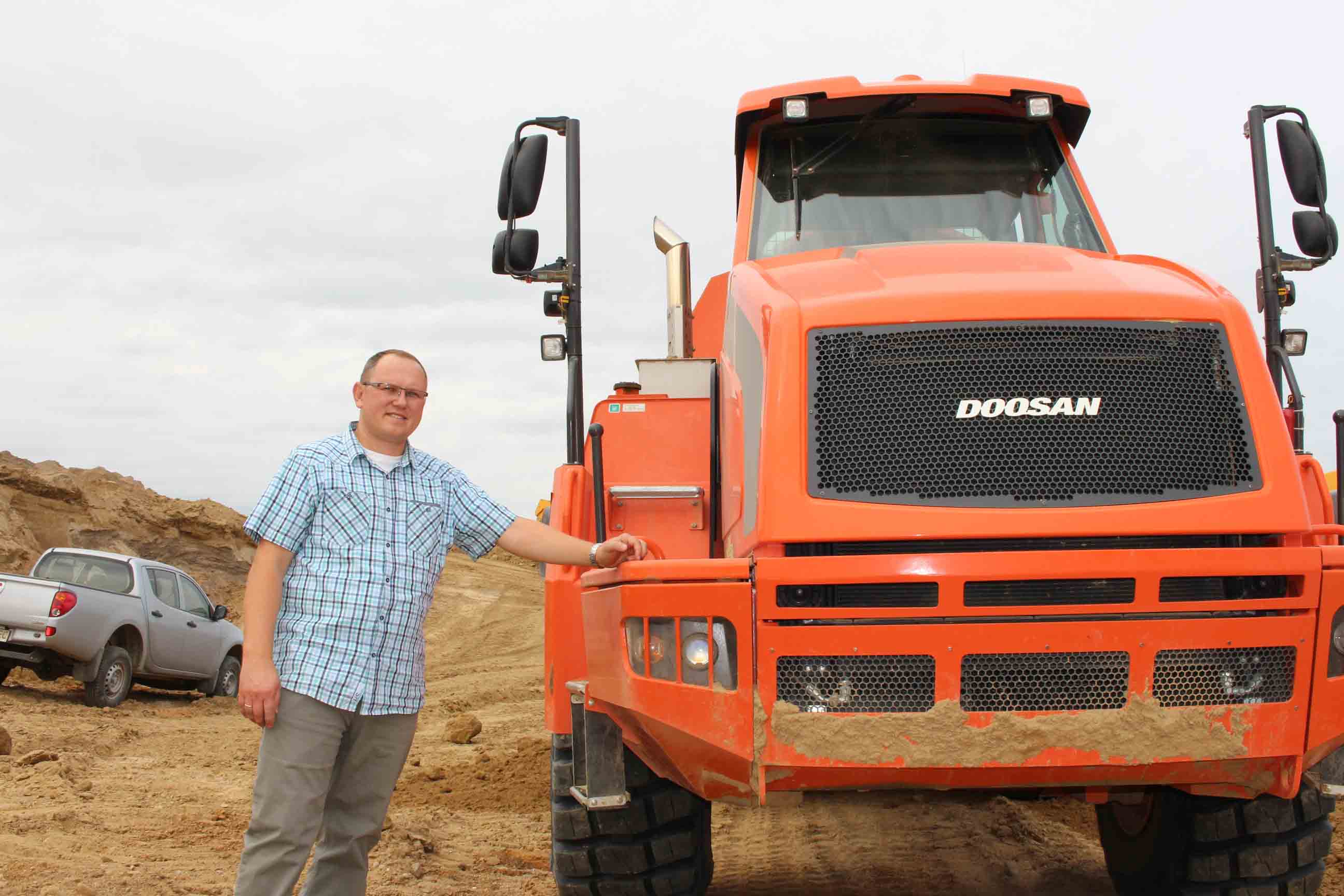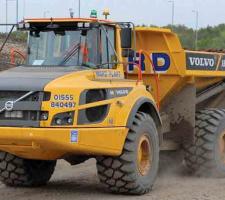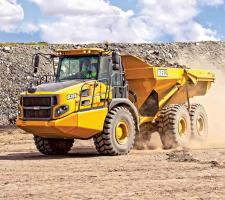
Haulers are proving their worth by transporting various materials for further processing.
There is no such thing as an ideal machine. Every piece of equipment has its strengths and weaknesses, and the latter are always worthy of improvement.
This is the view of
It says that these elements are combined in its machinery used in the Dbówko Mine, Poland, where a DA30 articulated dump truck (ADT) is joined by DX300 long reach excavators and a DL420-3 wheeled loader.
The open-pit mine, owned by Szczeciskie Kopalnie Surowców Mineralnych [SKSM/Szczecin Mineral Mines], is one of eight operations owned by the company, and Dbówko has rights to exploit a 200hectare mineral estate from which sand and gravel are extracted.
“We use this Korean manufacturer’s machinery to extract sand and gravel from both underwater deposits, where sediments are submerged in very shallow water, and open pits,” says Jacek Skocelas, who has managed the mine since 2012.
It is the first in Poland to operate a 220tonne German Rohr floating grab excavator and it also uses a Czech DCJ jaw crusher and cone crusher, and dump trucks, including a Doosan DA30. The machines run 20 hours-a-day, under a three-shift scheme, including four hours for maintenance at night.
A large investment programme means the new systems are designed to process 700tonne of raw material in less than an hour, compared to the previous rate of up to 300tonnes/hour.
The DA30 ADT, which uses components from global suppliers, such as
“As standard, the machine is equipped with scales to measure total load, and selectively for each run. It is also possible to programme for two operators per day. Moreover, each of the operators can see how many kilometres they have covered on a given day; how many cycles they made; how much load they transported incrementally; how much fuel they consumed, and what their average fuel consumption was. All this data can be viewed on a very clear colour display,” says one of the mine’s dump truck operators.
The body lifting feature has an acceleration button mounted in the handle for body tipping so the operator does not have to control the accelerator pedal with his foot.
The machines for SKSM were supplied by Grausch & Grausch (G&G), the Doosan authorised distributor in Poland.
In Jordan, COMEDAT, the country’s largest phosphate mining contractor, is using 90
Phosphate is generally consumed as fertiliser, and annual demand for it is growing at a rate almost twice as fast that of the human population. Although poor in water resources per capita, Jordan boasts plentiful supplies of phosphates, being the world’s fifth largest with an estimated 1.3 billion tonnes of phosphate reserves.
COMEDAT, a family-run business, is the owner of one of the largest fleets of Terex Trucks’ haulers in the world, consisting of a mixture of 91tonne capacity TR100s and 54.5tonne TR60s. It is a partnership that dates back to the 1970s,
The trucks, built in Motherwell, Scotland, are used to haul overburden removal, while others descend 56m below the surface to carry phosphate.
“Terex Trucks delivers excellent performing machines,” says Sameh Dababneh, CEO of COMEDAT.
“From experience, no matter how hard I push the trucks they keep on going, so over the years whenever I have expanded my fleet there is only one company I look to.”
Meanwhile, in the UK, the Chepstow Plant International mineral extraction company is strengthening its fleet with the purchase of a further 13
“Safety is the number one priority in our industry and protecting our employees is of paramount importance to us. We purchased our first Bell ADT back in 2000 because of the safety features it provided,” says John Corcoran, managing director at Chepstow Plant International.
“Sixteen years later, we’re still placing our confidence in Bell machines, which continue to be safe, secure and reliable.”
Adding to the machines’ appeal is Bell Equipment’s Fleetm@tic technology, installed in both new and existing Bell models being used by Chepstow Plant.
The technology has been highly successful in providing the Chepstow Plant operational team with automated reports, alerts, production data and pole-to-pole satellite coverage, enabling the Chepstow Plant’s CI (Continuous Improvements) Department to manage its fleet with greater control and efficiency.
“Fleetm@tic, Bell Equipment’s purpose-designed, on-board fleet management system, provides us with an effective tool which, when used continuously, can help deliver the lowest cost per tonne, to maximise returns on investment to us and our clients,” says Corcoran.
“We have also been instrumental in the ongoing development of Fleetm@tic, working directly with Bell in South Africa to further enhance the system and the extent to which it can be used. Most recently we have been looking how it can support site and operator safety. This has resulted in the system being able to monitor not just a machine’s production performance but also vital safety elements, such as physical stability and tipping points.”
In another move,
“Our customers are often involved in many of the country’s major infrastructure projects. Expectations have to be met by a modern machine taskforce of new, highly capable vehicles with the ability to deliver results, against impressive fuel consumption levels,” says David Brown, managing director.
The 18 machines are being distributed directly to sites across the country, with plans in place to put them through their paces with immediate effect.
“Investing in our client relationships and making customer service count is extremely important to us. Our relationship with JoinPoint has developed alongside the technological advancement of our machines, both of which have evolved to deliver and achieve even more,” says Nick Learoyd, managing director of Bell Equipment UK.
Since purchasing his first
“The Volvo ADT is second to none on the market today in my opinion and all the trucks I’ve ever run have proved themselves over and over again in terms of reliability, productivity and fuel savings,” says Martyn Ward.
“And it’s like anything else: if you look after your kit, then it’ll look after you and we’ve got some of our trucks which have achieved over 16,000 hours on original engines.”
The latest A30Gs join a fleet of 36 Volvo haulers, predominantly made up of the A30-sized truck.
“While we still run A35s and A40s, the optimum-sized for general hire is the A30 hence the reason for adding three more to the fleet”
The new trucks have been deployed on a number of large infrastructure projects currently taking place in Scotland such as the major earthworks contract the Ward’s major earthworks contract on the A9 development near Aviemore and hire work on the M8/M73/M74 widening scheme as well as other general muck-raking activities.
The A30G hauler from Volvo meets the requirements of Stage IV final emissions legislation, being powered by an electronically controlled, six-cylinder 264kW turbo-charged Volvo V-ACT diesel engine, featuring high torque at low engine speeds.
This, says Volvo, results in good fuel efficiency; high performance; quicker engine response and less wear, meaning a long service life.
Purpose-built by Volvo, the engine is designed to match exactly the Volvo drive train, ensuring the best use of power and torque, even in tough working conditions.
“Delivering exceptional fuel efficiency, it is matched to a torque converter with built in lock-up function and fitted with a fully automatic fast adaptive transmission. The rest of the Volvo-designed and built powertrain has been reinforced to cope with the higher torque output of the engine,” says Volvo.
With a carrying capacity of 28tonnes and heaped capacity of 17.5m³, the Volvo A30G has a maximum speed of 53km/hour, and is also fitted with CareTrack as standard. This is Volvo’s telematics system that enables remote monitoring of a wide range of machine functions, such as location, fuel consumption and service reminders.

















